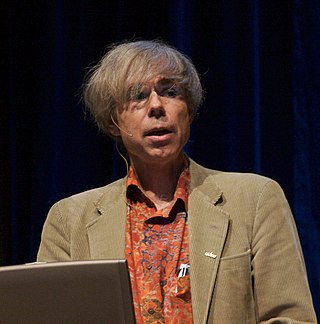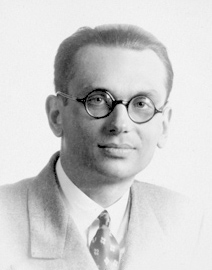
Donald Ervin Knuth is an American computer scientist, mathematician, and professor emeritus at Stanford University. He is the 1974 recipient of the ACM Turing Award, informally considered the Nobel Prize of computer science. Knuth has been called the "father of the analysis of algorithms".

Douglas Richard Hofstadter is an American scholar of cognitive science, physics, and comparative literature whose research includes concepts such as the sense of self in relation to the external world, consciousness, analogy-making, artistic creation, literary translation, and discovery in mathematics and physics. His 1979 book Gödel, Escher, Bach: An Eternal Golden Braid won both the Pulitzer Prize for general nonfiction and a National Book Award for Science. His 2007 book I Am a Strange Loop won the Los Angeles Times Book Prize for Science and Technology.

Gregory John Chaitin is an Argentine-American mathematician and computer scientist. Beginning in the late 1960s, Chaitin made contributions to algorithmic information theory and metamathematics, in particular a computer-theoretic result equivalent to Gödel's incompleteness theorem. He is considered to be one of the founders of what is today known as algorithmic complexity together with Andrei Kolmogorov and Ray Solomonoff. Along with the works of e.g. Solomonoff, Kolmogorov, Martin-Löf, and Leonid Levin, algorithmic information theory became a foundational part of theoretical computer science, information theory, and mathematical logic. It is a common subject in several computer science curricula. Besides computer scientists, Chaitin's work draws attention of many philosophers and mathematicians to fundamental problems in mathematical creativity and digital philosophy.

Kurt Friedrich Gödel was a logician, mathematician, and philosopher. Considered along with Aristotle and Gottlob Frege to be one of the most significant logicians in history, Gödel had an immense effect upon scientific and philosophical thinking in the 20th century, a time when others such as Bertrand Russell, Alfred North Whitehead, and David Hilbert were using logic and set theory to investigate the foundations of mathematics, building on earlier work by the likes of Richard Dedekind, Georg Cantor and Gottlob Frege.
Mathematics is an area of knowledge that includes the topics of numbers, formulas and related structures, shapes and the spaces in which they are contained, and quantities and their changes. These topics are represented in modern mathematics with the major subdisciplines of number theory, algebra, geometry, and analysis, respectively. There is no general consensus among mathematicians about a common definition for their academic discipline.
The philosophy of mathematics is the branch of philosophy that studies the assumptions, foundations, and implications of mathematics. It aims to understand the nature and methods of mathematics, and find out the place of mathematics in people's lives. The logical and structural nature of mathematics makes this branch of philosophy broad and unique.

Ian Nicholas Stewart is a British mathematician and a popular-science and science-fiction writer. He is Emeritus Professor of Mathematics at the University of Warwick, England.

Sir William Timothy Gowers, is a British mathematician. He is Professeur titulaire of the Combinatorics chair at the Collège de France, and director of research at the University of Cambridge and Fellow of Trinity College, Cambridge. In 1998, he received the Fields Medal for research connecting the fields of functional analysis and combinatorics.

John Allen Paulos is an American professor of mathematics at Temple University in Philadelphia, Pennsylvania. He has gained fame as a writer and speaker on mathematics and the importance of mathematical literacy. Paulos writes about many subjects, especially of the dangers of mathematical innumeracy; that is, the layperson's misconceptions about numbers, probability, and logic.

Donald Kennedy was an American scientist, public administrator, and academic. He served as Commissioner of the U.S. Food and Drug Administration (1977–1979), President of Stanford University (1980–1992), and Editor-in-Chief of Science (2000–2008). Following this, he was named president emeritus of Stanford University; Bing Professor of Environmental Science and Policy, emeritus; and senior fellow of the Freeman Spogli Institute for International Studies.
Kenneth Jon Barwise was an American mathematician, philosopher and logician who proposed some fundamental revisions to the way that logic is understood and used.

László Lovász is a Hungarian mathematician and professor emeritus at Eötvös Loránd University, best known for his work in combinatorics, for which he was awarded the 2021 Abel Prize jointly with Avi Wigderson. He was the president of the International Mathematical Union from 2007 to 2010 and the president of the Hungarian Academy of Sciences from 2014 to 2020.

Murderous Maths is a series of British educational books by author Kjartan Poskitt. Most of the books in the series are illustrated by illustrator Philip Reeve, with the exception of "The Secret Life of Codes", which is illustrated by Ian Baker, "Awesome Arithmetricks" illustrated by Daniel Postgate and Rob Davis, and "The Murderous Maths of Everything", also illustrated by Rob Davis.

Mathematical beauty is the aesthetic pleasure derived from the abstractness, purity, simplicity, depth or orderliness of mathematics. Mathematicians may express this pleasure by describing mathematics as beautiful or describe mathematics as an art form, or, at a minimum, as a creative activity.

Barry Charles Mazur is an American mathematician and the Gerhard Gade University Professor at Harvard University. His contributions to mathematics include his contributions to Wiles's proof of Fermat's Last Theorem in number theory, Mazur's torsion theorem in arithmetic geometry, the Mazur swindle in geometric topology, and the Mazur manifold in differential topology.

Edward Vladimirovich Frenkel is a Russian-American mathematician working in representation theory, algebraic geometry, and mathematical physics. He is a professor of mathematics at University of California Berkeley, a member of the American Academy of Arts and Sciences, and author of the bestselling book Love and Math.

Roger Conant Lyndon was an American mathematician, for many years a professor at the University of Michigan. He is known for Lyndon words, the Curtis–Hedlund–Lyndon theorem, Craig–Lyndon interpolation and the Lyndon–Hochschild–Serre spectral sequence.
Robert Ian Goldblatt is a mathematical logician who is Emeritus Professor in the School of Mathematics and Statistics at Victoria University, Wellington, New Zealand. His doctoral advisor was Max Cresswell. His most popular books are Logics of Time and Computation and Topoi: the Categorial Analysis of Logic. He has also written a graduate level textbook on hyperreal numbers which is an introduction to nonstandard analysis.
Jason Rosenhouse is an American author and professor of mathematics at James Madison University, where he was originally appointed an assistant professor in 2003. He became a full professor in 2014. His research focuses on algebraic graph theory, as well as analytic number theory. He ran the blog Evolution Blog at National Geographic's ScienceBlogs, where he frequently criticized creationism. In late 2016 he announced that he was abandoning the blogging format. He has contributed to the pro-evolution blog The Panda's Thumb, and has also contributed to the Huffington Post about topics such as the Higgs boson, in addition to creationism.
The Carl Sagan Prize for Science Popularization is an annual $5,000 award presented in honor of the late scientist Carl Sagan by Wonderfest, the San Francisco Bay Area Beacon of Science, to a scientist who has "contributed mightily to the public understanding and appreciation of science."














